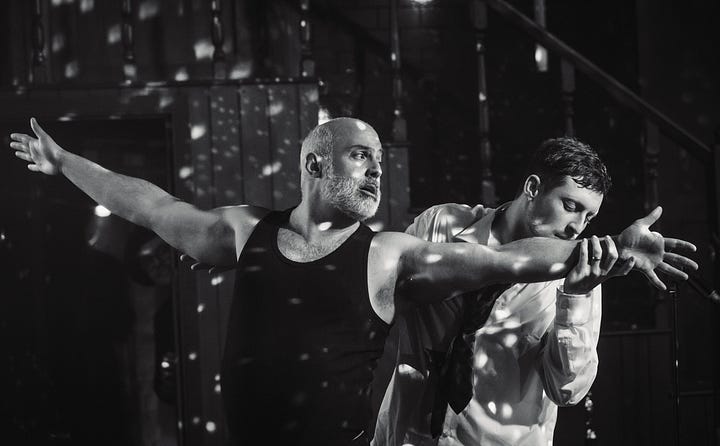Hey, clowns!
I wanted to thank everyone who shared my last blog post about grief, comedy and clown work. It resulted in a bunch of new subscribers.
I also received some wonderful messages of support.
I’ve been reluctant to share personal stuff in this book. The goal was to help other clowns on their journey. But I’m starting to understand better how technique and stories can co-exist. The only path I can speak on is mine. You have to hope people will see themselves in your struggles.
All right, let’s get to it. Here’s a chapter I’ve been working on, regarding one of the great intangibles when it comes to clown work.
******


I saw an ad on Instagram the other day.
The spokesperson was an older man with a manicured white beard and a crucifix earring. He was selling easy-to-remember audio bullet points for 25 best-selling books. You know the type. Get rich. Take charge. Make friends. The kind they display at airport bookstores – right beside the iPhone chargers and navy blue neck pillows.
The spokesperson promised that — if you listened for less than an hour — you’d be armed with surefire strategies to be the life of the party.
Be the most interesting person in the room.
It reminded me of when I first started doing improv. I had a 101 class where almost every scene was a blind date or business meeting. The ones that weren’t tended to be meta scenes about acting, improvising or being on stage. The teacher – a young white hipster in converse and plaids – ranted about how we all needed to live more robust lives. Read books! Watch movies! Go to museums! Take trips!
Interesting people create interesting comedy!
(It should be noted that I cannot remember this teacher’s name or face.)
I focus a lot on being interesting when I teach. New clowns tend to worry about being funny. When you’re first starting out, this can pay dividends. You act desperate. Make bold moves. Radiate with clueless desperation. There’s no shortage of tension in an intro clown class. Many students freeze, hoping the class will take pity and save them. Chasing laughs looks dynamic in comparison. At least you’re making an active choice.
But soon they hit a wall. Especially out in the wild. A real audience wants to have fun, but they’re not rooting for us like our classmates. We have to build our relationship with them from scratch. If you only want laughs from them, they can sense it.
That might seem like a good thing, but it usually backfires. Clown is supposed to be a courtship. A dance where both parties work together, but still surprise each other. Instead of creating an atmosphere of play, you’re now stuck in a transaction. It doesn’t matter who you are anymore. Laughter is just payment for a service you provide.
Interesting creates other possibilities. An interesting performer isn’t being judged joke to joke. You get more space to try things and take chances. Funny prioritizes the message. Interesting asks an audience to fall in love with the messenger.
But what makes a performer interesting?


It’s definitely not the ability to quote Jordan Peterson or rattle off anecdotes from Rich Dad, Poor Dad. Nor is it how many times you’ve been to The Getty or watched The Lord of the Rings. It’s great to be passionate about many things. We all should see the world. But hobbies and travel aren’t a substitute for charm and personality.
We’re often interested in people with money, means and power. But what if you were performing for a group of strangers unaware of your previous successes? Being interesting also isn’t based on experience or knowledge. If those things mattered so much, why are we so enamored with babies and pets?
I wish I offer give a binary solution. Ten Simple Ways to Be Interesting and Clown Your Way to the Best Sex of Your Life. But the keys to being interesting are different for every individual. It’s about the energy you’re able to generate and how you choose to share it. The sum of who you are as a person.
It doesn’t matter if you're big, small, young, old, quiet, flashy, capable or an absolute trash fire. Can you get the audience to tune into your unique frequency? And if they do connect, are they compelled to keep listening or desperate to change the channel?
When I teach clown, I’m not teaching comedy. I am attempting to amplify a student’s signal. Technique exists to clarify their ideas. I try to show them how to avoid noise and misdirection. To leave room for the audience, so they feel permission to voice their opinions. If a clown is coming from a place of joy, all they need to do is present their authentic self. The funny will reveal itself naturally.
It’s a long process. But I always start with the same first step.
Strip away everything but the play.
(The next part of the chapter deals with more of the specifics on that process. Please share if you like this or leave a comment if you’re inspired!)
OTHER CLOWN BUSINESS!
LISTEN TO STAND UP AND CLOWN (THE PODCAST) If you like this Substack, the podcast is an even deeper dive into the clown process. Our latest episode is with comedy magician Nick Paul – and we discuss the similarities between clown and magic.
APPLE PODCASTS: shorturl.at/DFKR5
SPOTIFY: shorturl.at/HPQ18
STAND UP AND CLOWN RETURNS ON 1/22! The theme of the show is musical comedy – and we’ve got big names like Riki Lindhome, Morgan Jay, Luke Null, Courtney Pauroso and more! Get your tickets before they sell out.
1/22: https://www.elysiantheater.com/shows/standupandclown
ALSO CHECK OUT MY LINKTREE: This is where I list other classes and other projects – including Stamptown and my new series of shows with Rory Scovel.
https://linktr.ee/chad.damiani
AND FOLLOW ME @THECHADDAMIANI ON IG!




I am leaving a comment bc I'm inspired